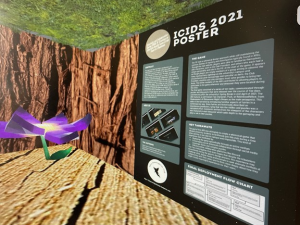
Storytelling is one of the oldest forms of entertainment. While more traditional methods are still popular, some storytellers take a modern approach, exploring transmedia storytelling or storytelling that occurs across various, often digital, platforms.
From December 7-10, 2021, storytellers from around the world attended the International Conference on Interactive Storytelling (ICIDS), including digital media master’s students, Diego L. Faverio and Iulia V. Popescu. Participants gathered virtually and in person in the beautiful country of Estonia for the conference.
“I was fortunate enough to learn about and interact with numerous projects like VR experiences, video games and digital art,” Faverio said. “We set out to create a sense of connection and collaboration through an interactive storytelling experience during a time when people were unable to do so because of the pandemic. ICIDS was the perfect fit for us, and other students should always strive to find their perfect fit as well.”
After they developed an alternate reality game (ARG) as part of a group of students also comprised of Angelica Calhoun, Andrew Futcher, Sterling Micallef, Joslyn Parchman and Ricardo Serrano, Popescu and Faverio then partnered up to co-author an article based on their experiences and lessons learned.
The game, based on the folklore of changelings, promoted a sense of collaboration and involvement through puzzles, stories and platforms. Called the “Fairy Investigation Club,” the ARG was posed as a student-run organization and enlisted students to join.
Under the guidance of Associate Professor Matthew Mosher, they submitted their work to ICIDS, entitling their paper “Creativity and Collaboration During COVID-19: Creating an Alternate Reality Game in the Face of a Pandemic.”
Following months of anticipation, they eventually heard back that their research was accepted as a poster/short paper, meaning that they would present their research as a poster and have their short paper published online.
“Working together to create an ARG was a fun experience where we all added to the team – whether that be with the narrative, puzzle design or 3D printing,” said Popescu. “Once we created the idea, it took off. And I was so happy to have the paper co-authored with Diego be accepted! Storytelling in different mediums has been my passion for a while now.”
Faverio and Popescu applied for funds from the Nicholson School of Communication and Media (NSCM) to attend. NSCM was able to support and fully fund them to attend the international conference virtually.
“Supporting our graduate students in showcasing their research and creative efforts is something that helps introduce students to this process, and allows students to connect with potential future colleagues and build relationships, which will help them advance on many levels,” said Boyd Lindsley, Ed.D., Senior Associate Director for the Nicholson School.
During their virtual presentation at the conference, they both donned avatars and walked around the room, inspecting the work of others, listening in and sharing their own research with people that worked in interactive storytelling all around the globe.
They stumbled into others from NSCM as well, such as Assistant Professor in the Games and Interactive Media Program, John Murray, Ph.D., who was presenting a virtual reality (VR) demo, “The Hollow Reach,” and another short paper whose collaborators included NSCM faculty member Dan Cox.
“This conference encompasses a highly creative field that I am personally passionate about and excited to see grow,” Faverio said. “I look forward to attending future conferences and I encourage anyone with an interest in interactive digital storytelling to attend ICIDS!”
Their short research paper, published on Springer Link, can be found here.
Published May 2, 2022. Written by Jacqueline Cardentey.
If you have any news, accomplishments or highlights about your work or life, please be sure to share them with us, by emailing us at nicholsonews@ucf.edu.